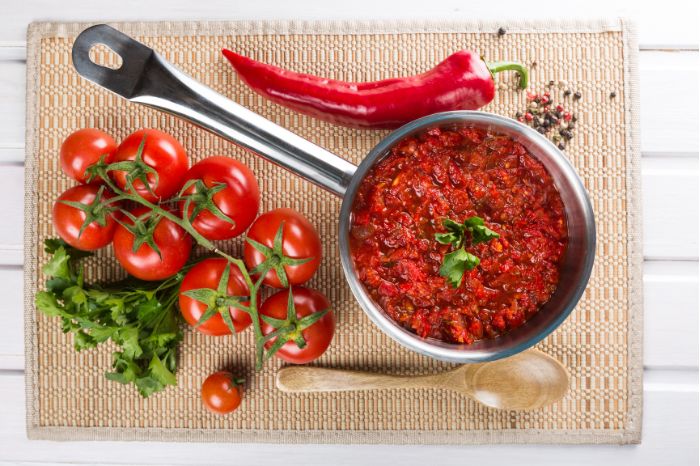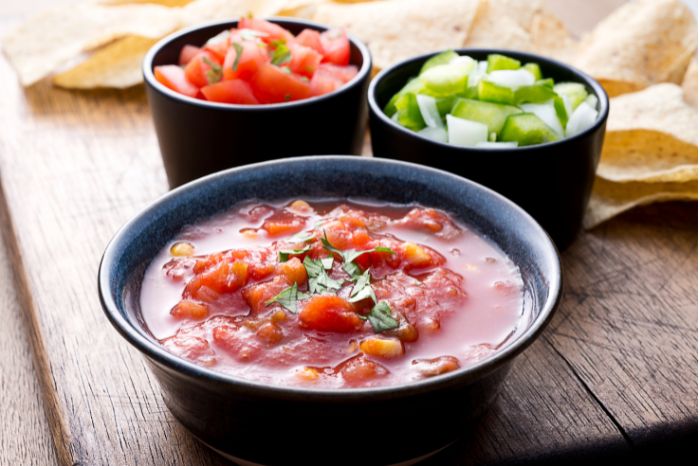Is Salsa Healthy To Eat?
- Salsa is a variety of sauces usually comprises of tomatoes and vegetables which is served with tacos and other Mexican and Mexican-American foods, and as dips for tortilla chips.
They may be raw or cooked and are usually served at room temperature.
Table of Contents

| Read : 10 Worst Food For Immune System
According to Wikipedia the word salsa means any kind of sauce in Spanish, in English, it refers specifically to these Mexican table sauces, with a flavor of tomato and chili.
Tortilla chips with salsa are famous in Mexican restaurants.
Salsas made with fruit, corn, or black beans later gives competition to tomato-based salsas.
| Later in the 2000s sweet salsas combining fruits with peppers like habanero, scotch bonnet, and datil (Wikipedia) have grown in acceptance and are served with frozen desserts, cheesecakes, and pound cakes. |
Is Salsa Healthy To Eat?
Yes, salsa is very healthy to eat as it has lots of minerals and vitamins like potassium, vitamins B, C, and E.
Also, it provides hydration and is very low in calorie count.
Though, always eat the low-sodium version to get the maximum benefits (HealthifyMe)
Why Should You Add Salsa to Your Diet?
Besides having a delicious quality salsa also has high nutritional value and is very rich in minerals and vitamins so you should add it to your next meal.
Nutritional Profile of Salsa
As per the USDA, around 100 grams of traditional salsa contains the following nutrients:
- Calories: 30 kcal
- Sodium: 758 mg
- Vitamin C: 7.3 mg
- Vitamin A: 303 IU
- Carbohydrates: 6.06 g
- Fibre: 3 g
- Fat: 0.19 g
Vitamins and Minerals
According to USDA data, 100 grams of ready-to-serve salsa has the following vitamins and minerals.
- Potassium: 258 mg
- Sodium: 656 mg
- Pantothenic Acid: 0.202 mg
- Vitamin E: 1.22 mg
- Vitamin B6: 0.176 mg
- Vitamin A: 24 µg
- Lycopene: 6310 µg
- Niacin: 1.12 mg
- Thiamine: 0.035 mg
- Calcium: 28 mg
- Magnesium: 15.2 mg
- Phosphorus: 32 mg

| Read: Is Barley Good For Diabetes? What We Think
Salsa: The Health Benefits You Didn’t Know
- Salsa is one of the most popular condiments and snacks around. Not only is it delicious, but it also has a variety of health benefits that you may not have known about.
From being rich in vitamins and minerals to provide an excellent source of dietary fiber, salsa is a great food to incorporate into your diet for a variety of reasons.
Read on to learn more about the health benefits of salsa!
Benefits of Eating Salsa
- Salsa is low in calories
Salsa is a healthy alternative to traditional dips and sauces, as it is low in calories. One tablespoon of salsa contains only 10 calories, making it an ideal addition to any healthy diet.
Salsa is a great way to add flavor to your meals without sacrificing your health.
By adding a few spoonfuls of salsa to your meal, you can enjoy the taste of this delicious condiment without consuming too many calories.
Salsa is not like other processed foods. Rather, it is low in calories. So, add this wonderful flavor to your diet irrespective of the quantity.
Experts say 2 tablespoons of salsa contains ten calories. This means salsa is low in calories.
- Salsa saves you from dehydration
The main element of Salsa is Tomatoes. Tomato is rich in water as 95% of tomato is water.
Research shows that water-rich foods can be helpful in preventing dehydration.
So, including this water-rich food keeps you hydrated and prevents dehydration.
- Exceptional potassium content
Most American people do not eat a potassium-rich diet as the maximum foods available are potassium deficient.
The western diet lacks potassium, while Salsa contains a rich quantity of potassium.
Studies show that potassium helps to retain standard levels of fluid inside our cells.
Potassium also helps muscle contraction and maintains normal blood pressure.
- Salsa can improve your heart health
Eating salsa can be a great way to boost your heart health. The main ingredient in salsa, tomatoes, is rich in lycopene, an antioxidant that helps protect against heart disease.
Additionally, the spices found in salsa such as garlic and onion can help reduce cholesterol levels and improve overall cardiovascular health.
Salsa is also low in sodium, which can help lower your risk of high blood pressure and stroke. Not to mention, the healthy fats found in some salsas, like avocados and olive oil, can help reduce inflammation and improve the health of your arteries.
All in all, eating salsa regularly can provide numerous heart-healthy benefits and make it a great addition to a healthy diet.
- Salsa is a good source of vitamins and minerals
Salsa is an incredibly healthy condiment that can be enjoyed by almost anyone. It is a great source of vitamins and minerals, including vitamins A, C, and K as well as calcium, potassium, and iron.
Not only is salsa healthy, it’s also packed with flavor, making it an easy and delicious way to add some extra nutrition to your meals.
The vitamins in salsa are beneficial for helping your body fight off disease, while the minerals like calcium and potassium help keep your bones and muscles strong.
Iron helps your body form red blood cells, which carry oxygen throughout the body.
All of these nutrients work together to keep you feeling your best and make sure you’re getting enough of the essential vitamins and minerals you need each day.
Not only is salsa healthy, but it’s also incredibly versatile.
You can use it in everything from tacos to burritos, salads to sandwiches, or even as a topping for grilled chicken or fish.
The possibilities are endless! So next time you’re looking for an easy and nutritious way to spice up a meal, reach for some salsa—it’s sure to give your dish a delicious kick
- Salsa is rich in Vitamins B, C, and E
Salsa has different vitamin B which helps to maintain a healthy nervous system.
Salsa is made of onions, tomatoes, and lime juice which are a good source of vitamin C. Vitamin C helps prevent heart disease.
Salsa is a good source of vitamin E, a powerful antioxidant that prevents inflammation and diseases.
- Salsa can defend against cancer
Salsa is made from tomatoes and tomatoes contain lycopene.
Lycopene reduces the risk of cancer.
- Salsa can help you control your blood sugar
Salsa is a healthy and delicious way to add flavor to your meals. It is full of vitamins, minerals, and antioxidants that can help regulate your blood sugar levels. Studies have shown that consuming salsa as part of a healthy diet can help reduce the risk of developing diabetes and improve your overall health.
When you consume salsa, the fiber content helps slow the digestion process, keeping your blood sugar levels in check. The fiber also helps keep you feeling full, which can prevent overeating and snacking.
Additionally, some salsas contain garlic or onion, both of which contain compounds that can lower blood sugar levels. The capsaicin in chili peppers can also help to lower blood sugar.
So if you’re looking for a way to help regulate your blood sugar, try incorporating some salsa into your diet. It’s an easy and delicious way to add flavor to your meals while still maintaining a healthy lifestyle.
It can steady blood sugar.
- Salsa can help you lose weight
One of the great benefits of eating salsa is that it is low in calories but still packed with flavor.
This makes it an ideal choice for those trying to lose weight, as you can enjoy the flavor without consuming too many calories.
Eating salsa can help you stick to a healthy eating plan, as it will add flavor without adding excess calories or fat.
Salsa is also high in fiber, which can help you feel fuller longer and prevent overeating.
Additionally, the vitamins and minerals in salsa can help improve your metabolism and increase your energy levels, allowing you to burn more calories throughout the day.
As such, eating salsa regularly can help you achieve your weight loss goals.
Overall, salsa is a healthy food choice that can help you achieve your weight loss goals. It is low in calories, but packed with nutrients and fiber, making it a great addition to any diet plan.
Eating salsa regularly can help you stay full longer, boost your metabolism, and reach your health goals.
It will help you burn fat.
- Salsa good source of citric acid
Lime juice added in salsa provides citric acid and it saves us from kidney stones.

| Read: What Are 5 Low-Glycemic Foods? Defination, Examples, Facts, Benefits
Keep in Mind Salsa Cons
- Allergies
Be aware of your allergies and pay attention to the label on the salsa that you are going to pick.
Studies reveal that you can be allergic to tomatoes if you have allergies to pollen.
If this is the case, you can opt for salsa with different flavors, such as mango salsa, instead of the traditional salsa made from tomatoes.
- Adverse Effects
Salsa is acidic in nature and it can activate the symptoms of Gastroesophageal Reflux Disease.
Thus, if you have heartburn or acid reflux, you should avoid eating salsa.
Also, salsa has onions and garlic, which are high in FODMAPs.
FODMAPs are compounds that cause gastrointestinal complaints.
So, if you have any of these disorders then it’s better to avoid salsa.
- Watch out for high sodium content
Salt is very harmful to health and salsa available in the market contains a lot of salt.
Research reveals too much sodium can cause weight gain, inflammation, bloating, and a rise in blood pressure.
Hence, before buying salsa from the store always read the sodium content on the nutrition label.
What is the healthiest thing to eat with salsa?
Salsa is most commonly eaten with chips but here I will tell you 10 healthy things to eat with salsa.
- With eggs. You can top scrambled eggs or an omelet with a big spoonful of salsa. Also, you can have this omelet salsa with a tortilla which is full of fiber.
- For cooking meat in the slow cooker. Cook meat with enough amount of salsa in the cooker (for a delicious taste and health benefits add olive oil instead of butter).
- Marinade. It is widely used as a marinade in America. Mix some canola oil and/or freshly squeezed citrus juice into the salsa to thin it out, then for any meat.
- With shrimp cocktail. You can use salsa with shrimp.
- Homemade chili. Add salsa to chili for a spicy flavor.
- On a baked potato. Give a boring potato some pizzazz by adding salsa, grilled peppers, onions, and a sprinkle of cheese for a hearty and satisfying lunch or dinner.
- Substitute salsa for salad dressing. You can enhance the taste and nutritional benefits of salad by adding salsa as a dressing.
- Top grilled fish with salsa. This works especially well with salmon combined with fruit-based salsa.
- Slather your hamburger with salsa. It will enrich the taste without adding more calories.
- Stir salsa into grits. Add it with Mexican cheese for a delicious delight to satisfy your taste buds.

| Read: How To Get Kids Eat Veggies-10 Easy Tips
Salsa Storage Tips and Food Safety
To avoid bacterial growth it should always be stored in freezers.
You can pay attention to the following points while storing:
- Always store salsa in a glass jar. Using other jars like plastic or steel can cause further reactions in its ingredients which may degrade its taste and cause contamination.
- Use an air-tight cap or seal to avoid oxidation. This air-tight can will keep it fresh for further use.
- You can store salsa in the refrigerator for up to 7 days. If you want to increase its shelf life then you can freeze it in sealed containers or heavy-duty freezer bags.
- Never forget to wash the vegetables which you are using to make salsa. As salsa is made from raw vegetables. So to avoid contamination wash the ingredients.
Conclusion
- Salsa is rich in essential vitamins and minerals but keeps yourself alert with the sodium content in the salsa you select from the store.
It is very low in calories so you can include it in your diet without thinking twice.
You can pair salsa with healthier counterparts in meals, such as scrambled eggs, grilled fish, tacos, or any of your other favorite dishes,
- Salsa will add many health benefits if incorporated into your diet with healthy options.
FAQ’s
Q. What’s the benefit of eating salsa?
There is huge list of benefits though some of them are it is full of nutrients, vitamins, and minerals, salsa is low-calorie food so helps in reducing weight and salsa helps to control blood sugar.
Q. Is salsa good for dieting?
Yes salsa is very good for dieting as it is low in calories. 1tbs of salsa contains 10 calories.
Q. Is salsa good for your heart?
Yes, it is. Onion and garlic reduce the chances of blood clots and heart attacks, so salsa is perfect for your heart.
Q. Is salsa a good source of lycopene?
Yes, it is. Because it contains tomatoes which is rich in lycopene. According to USDA, around 100 grams of salsa contains 6310 µg of lycopene.


